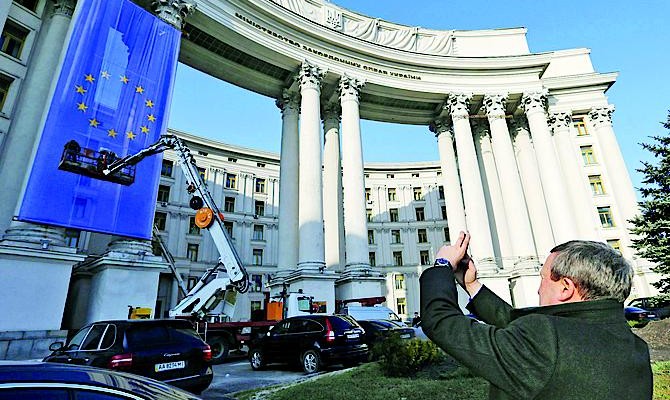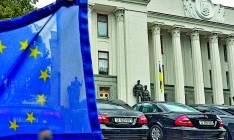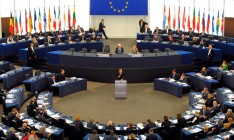Politics
European integrationVisa-free regime with EU is postponed for Ukrainians again

European experts are preparing the first review of fulfillment of the second phase of the plan for visa liberalization by Ukraine. The document will be published within the next several months, but experts have already noted that Kyiv has failed to fulfill a number of its obligations. This mainly applies to the delay in the introduction of biometric passports.
Quarterly assessments
European experts, who studied the level of fulfillment of the second phase of actions on visa liberalization for ten days, completed their visit to Ukraine at the end of last week. The delegation included experts from the European Commission, EU member countries and the European Agency for the Management of Operational Cooperation at the External Borders of the Member States of the European Union (Frontex). Describing the tasks of the visit, the EU Representative Office in Ukraine informed that the attention would primarily be focused on how Kyiv acts regarding issues of migration, provision of asylum to foreigners, protection of personal data and border management.
So far, neither the EU nor Ukraine has commented on the results of the European expert mission. The Ministry of Foreign Affairs told Capital it was not ready to discuss this issue, while the EU Representative Office replied that the results will very soon be published in a press release.
“This was an evaluation mission and its objective was to look into the situation on-site. We will receive the verdict of the Europeans in the first report regarding the second phase,” said Director of the Institute of Euro-Atlantic Cooperation Oleksandr Sushko. He predicts that processing of the data collected in Ukraine and drawing up the report will take at least two months.
As a reminder, on November 22, 2010 the EU presented Kyiv with an action plan for Ukraine for establishing a visa-free regime for short-stay travel. The plan was divided into two phases. During the first phase, Ukraine undertook to introduce changes to the legislation on anti-corruption policy, counteraction to discrimination, additional protection of refugees and protection of personal data. On June 23, the EU Council for Foreign Affairs announced that Ukraine fulfilled the entire package of tasks of the first phase and approved transition to the second phase, during which Kyiv must show how it is enforcing the adopted laws and introduce an innovation that is critical for the EU, namely, biometric passports and the technologies required for their application. Earlier, the leadership of the Foreign Affairs Ministry repeatedly predicted that Ukraine would complete the second stage of visa liberalization by the end of this year or the beginning of next year.
Passport control
Sushko does not rule out that the first report of the European experts on the second phase may contain remarks to Ukraine. “There were many claims on the part of EU to Kyiv because the citizens of other countries, who requested asylum in Ukraine, in particular due to political persecution, were sent home forcefully. Now, we will find out whether the situation has changed,” he said.
The expert, however, believes that the terms of introduction of biometric passports for Ukrainians remains the most painful issue for official Kyiv. Earlier, Foreign Minister Pavlo Klimkin announced that such documents would be issued in January-February 2015. The state-owned factory Ukraina was contracted to produce them. “I think the EU is puzzled why the production of these passports has not yet begun, though their samples have been approved,” Sushko responded predicting the reaction of the EU.
Former spokesman of the Foreign Ministry Oleh Voloshyn believes that the situation with biometric passports will be the focus of the report of the European experts. “This is the key problem. Nothing will be achieved as long as there are no biometric passports. For Europe, it is a guarantee that there will be no illegal migrants from Asia and Africa, drug dealers and prostitutes,” Voloshyn told Capital. He assumed that the Ukrainian side will justify the delay in the process by the war in Donbas. “This, however, is not an excuse. Moldova, which started European integration together with us, also has Transdnistria. But it obtained a visa-free regime. So, the pretence of Donbas is not a problem,” he insisted.
A member of the European Integration Committee, MP Yuriy Blahodyr (Sovereign European Ukraine) failed to forecast when Ukraine would be able to resolve the biometric passport issue. “From the legal standpoint, everything was done for the issuing of biometric passports in Ukraine. There is no clarity why the issue of their production is not being resolved,” he said.
Sushko believes that the current situation indicates that even if Ukraine promptly heeds all the remarks of the EU experts, there can be no talk about a visa-free regime until the end of next year.






 of the agreement of syndication with Financial Times Limited are strictly prohibited. Use of materials which refers to France-Presse, Reuters, Interfax-Ukraine, Ukrainian News, UNIAN agencies is strictly prohibited. Materials marked
of the agreement of syndication with Financial Times Limited are strictly prohibited. Use of materials which refers to France-Presse, Reuters, Interfax-Ukraine, Ukrainian News, UNIAN agencies is strictly prohibited. Materials marked  are published as advertisements.
are published as advertisements.